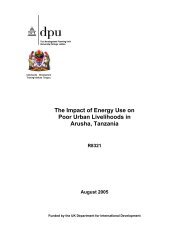EPA Review Annex Documents - DFID
EPA Review Annex Documents - DFID
EPA Review Annex Documents - DFID
Create successful ePaper yourself
Turn your PDF publications into a flip-book with our unique Google optimized e-Paper software.
Incentives from assistance<br />
No major assistance to trade negotiations was identified in the D.R. However, some<br />
suspicion aroused around the ownership and role of the CRNM during the <strong>EPA</strong><br />
negotiations. This suspicion was highly fuelled by some CARICOM countries wanting to<br />
delay the <strong>EPA</strong> agreement, and resulted in the integration of the CRNM within the<br />
structure of the CARICOM secretariat.<br />
Lessons<br />
• Importance of involvement of private sector during negotiations<br />
• Experience acquired in previous negotiations is key for successful negotiations<br />
• The MFN clause included in the <strong>EPA</strong> for developed countries and countries with more<br />
than 1% of world exports, has placed CARIFORUM’s <strong>EPA</strong> commitments as the most<br />
likely ceiling for future market opening agreements.<br />
5. Main Lessons of the case studies<br />
This section concludes the case studies with the main lessons arising from the analysis.<br />
Lack of human resources is a significant negotiating constraint<br />
As expected, poorer countries faced larger resource constraints during the negotiations.<br />
Specifically, two main gaps are identified. The first gap is the lack of trained trade<br />
negotiators, especially regarding other trade related issues. This is a very significant in<br />
the case of Ethiopia, and to a lesser extent for Nigeria. A second gap, and perhaps more<br />
important, is the lack of capacity to conduct impact studies in both Ethiopia and Nigeria,<br />
which affects the capacity to prepare negotiating positions.<br />
Other trade negotiations may have better allocation of resources<br />
Despite existing resource constraints some interesting elements emerged around the<br />
allocation of relevant ministry staff. The most interesting resource allocation being<br />
Nigeria, where most ministry staff dedicated to trade negotiations is allocated in the<br />
WTO area. Also, Ethiopia allocates significant amount of staff to bilateral and trilateral<br />
trade agreements. While these choices surely reflect domestic trade policy preferences,<br />
96 97<br />
they do not necessarily imply more real commitment in these areas.<br />
This has clear implications when considering the opportunity costs of negotiating these<br />
agreements. While it may the case that the most qualified staff has been absorbed by<br />
the <strong>EPA</strong> negotiations, it is also true that larger numbers of staff remain linked to other<br />
trade negotiating processes, which are likely to have less impact on their respective<br />
economies (i.e. staff for trilateral agreements in Ethiopia or for UNCTAD in Nigeria).<br />
96 While Nigeria is a big and important developing country voice in the WTO, the allocation of<br />
resources do not necessarily correspond with more WTO action, and with certainty it is not<br />
associated with more commitment to multilateral liberalisation.<br />
97 The fact that the <strong>EPA</strong>s are negotiated regionally implies a stronger role for regional secretariats<br />
during the negotiations, and some countries may rely on secretariat staff to carry out some of the<br />
negotiating tasks.<br />
83
















